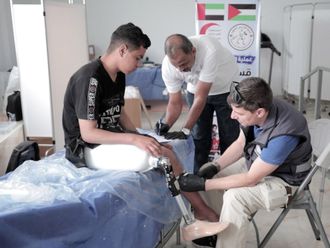Dubai: The number of people with pre-diabetes in the UAE may exceed those with diagnosed diabetes, according to a senior doctor from the Dubai Health Authority (DHA), who stressed the importance of diet and exercise to delay progression to type 2 diabetes.
The cautionary advice coincides with an international study released this week, which suggests that pre-diabetics can stave off diabetes by losing about 10 per cent of their body weight. (Patients diagnosed as pre-diabetic have blood sugar levels higher than normal but not yet high enough to be type 2 diabetes.)
Given that 20 per cent of the UAE population is diabetic and another 18 per cent at high risk – as per DHA figures – specialists said behavioural intervention can reduce damage to one’s health and reduce healthcare costs in the long term.
Specialists in the UAE mirrored, in opinion, the findings from the US-based Johns Hopkins scientists who recommend lifestyle changes to bring blood sugar levels back to normal.
According to the Johns Hopkins study, people with pre-diabetes who lose roughly 10 per cent of their body weight within six months of diagnosis dramatically reduce their risk of developing type 2 diabetes over the next three years.
Speaking exclusively to Gulf News, Dr M. Hamed Farooqi, Director of the Dubai Diabetes Centre under the DHA said that it is difficult to know the exact prevalence of pre-diabetes.
“It is thought that the number of people with pre-diabetes may exceed those with diagnosed diabetes,” he said.
Referring to the study, he pointed out that the most effective way to prevent this large number of people with pre-diabetes from developing type 2 diabetes is to institute programmes that recommend proper diet and exercise.
However, he said, apart from recommendation, it is important to ensure compliance.
“This cannot be accomplished by the healthcare providers alone. It requires efforts by family and community members and the government as well. Although it is difficult to put a monetary value to this effort, the actual health benefits of the institution of such a programme will definitely outweigh the costs,” he said.
Speaking to Gulf News, Dr Zia Hassan, endocrinologist at Northwest Clinic For Diabetes And Endocrinology in Dubai, said that is critical to prevent pre-diabetes from progressing to type 2 diabetes because of the associated complications.
He said: “Uncontrolled diabetes can lead to several complications including micro risks like retinopathy [damage to the retina], nephropathy [kidney disease] and neuropathy [damage to nerves that could result in amputation]. The macro risk includes coronary artery disease and stroke.”











